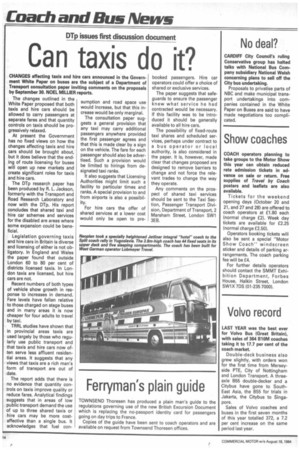DTp issues first discussion document
Page 16

If you've noticed an error in this article please click here to report it so we can fix it.
Can taxis do it?
CHANGES affecting taxis and hire cars announced in the Government White Paper on buses are the subject of a Department of Transport consultation paper inviting comments on the proposals by September 30. NOEL MILLIER reports.
The changes outlined in the White Paper proposed that both taxis and hire cars should be allowed to carry passengers at separate fares and that quantity controls on taxis should be progressively relaxed.
At present the Government has no fixed views on how the changes affecting taxis and hire cars should be brought about,' but it does believe that the ending of route licensing for buses will open up new markets and create significant roles for taxis and hire cars.
The DTp research paper has been produced by R. L. Jackson, formerly with the Transport and Road Research Laboratory and now with the DTp. His report concludes that shared taxi and hire car schemes and services for the disabled are areas where some expansion could be beneficial.
Legislation governing taxis and hire cars in Britain is diverse and licensing of either is not obligatory. In England and Wales the paper found that outside London 60 to 80 per cent of districts licensed taxis. In London taxis are licensed, but hire cars are not.
Recent numbers of both types of vehicle show growth in response to increases in demand. Fare levels have fallen relative to those charged on stage buses and in many areas it is now cheaper for four adults to travel by taxi.
TRRL studies have shown that in provincial areas taxis are used largely by those who regularly use public transport and that taxis and hire cars now often serve less affluent residential areas. It suggests that any views that taxis are a rich man's form of transport are out of date.
The report adds that there is no evidence that quantity controls on taxis improve quality or reduce fares. Analytical findings suggests that in areas of low public transport demand the use of up to three shared taxis or hire cars may be more costaffective than a single bus. It acknowledges that fuel con sumption and road space use would increase, but that this increase would be only marginal.
The consultation paper suggests a general provision that any taxi may carry additional passengers anywhere provided the first passenger agrees and that this is made clear by a sign on the vehicle. The fare for each passenger should also be advertised. Such a provision would be limited to hirings from designated taxi ranks.
It also suggests that Licensing Authorities might limit such a facility to particular times and ranks. A special provision to and from airports is also a possibility.
For hire cars the offer of shared services at a lower cost would only be open to pre booked passengers. Hire car operators could offer a choice of shared or exclusive services.
The paper suggests that safeguards to ensure the passenger knew what service he had contracted would be necessary. If this facility was to be introduced it should be generally available to all hire cars.
The possibility of fixed-route taxi shares and scheduled services, perhaps under contract to a bus operator or local authority, is also considered in the paper. It is, however, made clear that changes proposed are designed to remove barriers to change and not force the relevant trades to change the way they operate.
Any comments on the prospect of shared taxi services should be sent to the Taxi Section, Passenger Transport Division, Department of Transport, 2 Marsham Street, London SW1 3E B.








































































